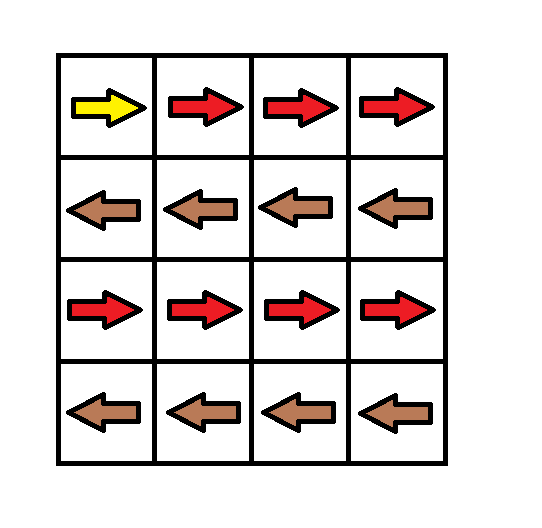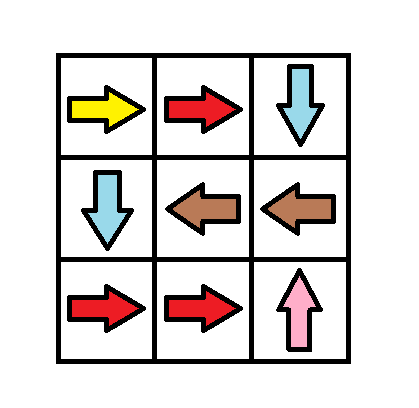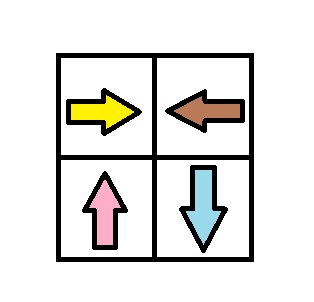LeetCode in Kotlin
1368. Minimum Cost to Make at Least One Valid Path in a Grid
Hard
Given an m x n grid. Each cell of the grid has a sign pointing to the next cell you should visit if you are currently in this cell. The sign of grid[i][j] can be:
1which means go to the cell to the right. (i.e go fromgrid[i][j]togrid[i][j + 1])2which means go to the cell to the left. (i.e go fromgrid[i][j]togrid[i][j - 1])3which means go to the lower cell. (i.e go fromgrid[i][j]togrid[i + 1][j])4which means go to the upper cell. (i.e go fromgrid[i][j]togrid[i - 1][j])
Notice that there could be some signs on the cells of the grid that point outside the grid.
You will initially start at the upper left cell (0, 0). A valid path in the grid is a path that starts from the upper left cell (0, 0) and ends at the bottom-right cell (m - 1, n - 1) following the signs on the grid. The valid path does not have to be the shortest.
You can modify the sign on a cell with cost = 1. You can modify the sign on a cell one time only.
Return the minimum cost to make the grid have at least one valid path.
Example 1:

Input: grid = [[1,1,1,1],[2,2,2,2],[1,1,1,1],[2,2,2,2]]
Output: 3
Explanation: You will start at point (0, 0). The path to (3, 3) is as follows. (0, 0) –> (0, 1) –> (0, 2) –> (0, 3) change the arrow to down with cost = 1 –> (1, 3) –> (1, 2) –> (1, 1) –> (1, 0) change the arrow to down with cost = 1 –> (2, 0) –> (2, 1) –> (2, 2) –> (2, 3) change the arrow to down with cost = 1 –> (3, 3) The total cost = 3.
Example 2:

Input: grid = [[1,1,3],[3,2,2],[1,1,4]]
Output: 0
Explanation: You can follow the path from (0, 0) to (2, 2).
Example 3:

Input: grid = [[1,2],[4,3]]
Output: 1
Constraints:
m == grid.lengthn == grid[i].length1 <= m, n <= 1001 <= grid[i][j] <= 4
Solution
import java.util.LinkedList
import java.util.Objects
import java.util.Queue
@Suppress("NAME_SHADOWING")
class Solution {
private val dir = arrayOf(
intArrayOf(0, 0),
intArrayOf(0, 1),
intArrayOf(0, -1),
intArrayOf(1, 0),
intArrayOf(-1, 0),
)
fun minCost(grid: Array<IntArray>): Int {
val visited = Array(grid.size) { IntArray(grid[0].size) }
val queue: Queue<Pair> = LinkedList()
addAllTheNodeInRange(0, 0, grid, queue, visited)
if (visited[grid.size - 1][grid[0].size - 1] == 1) {
return 0
}
var cost = 0
while (queue.isNotEmpty()) {
cost++
val size = queue.size
for (i in 0 until size) {
val pa = queue.poll()
for (k in 1 until dir.size) {
val m = Objects.requireNonNull(pa).x + dir[k][0]
val n = pa.y + dir[k][1]
addAllTheNodeInRange(m, n, grid, queue, visited)
if (visited[grid.size - 1][grid[0].size - 1] == 1) {
return cost
}
}
}
}
return -1
}
private fun addAllTheNodeInRange(
x: Int,
y: Int,
grid: Array<IntArray>,
queue: Queue<Pair>,
visited: Array<IntArray>,
) {
var x = x
var y = y
while (x >= 0 && x < visited.size && y >= 0 && y < visited[0].size && visited[x][y] == 0) {
queue.offer(Pair(x, y))
visited[x][y]++
val d = dir[grid[x][y]]
x += d[0]
y += d[1]
}
}
private class Pair(var x: Int, var y: Int)
}

